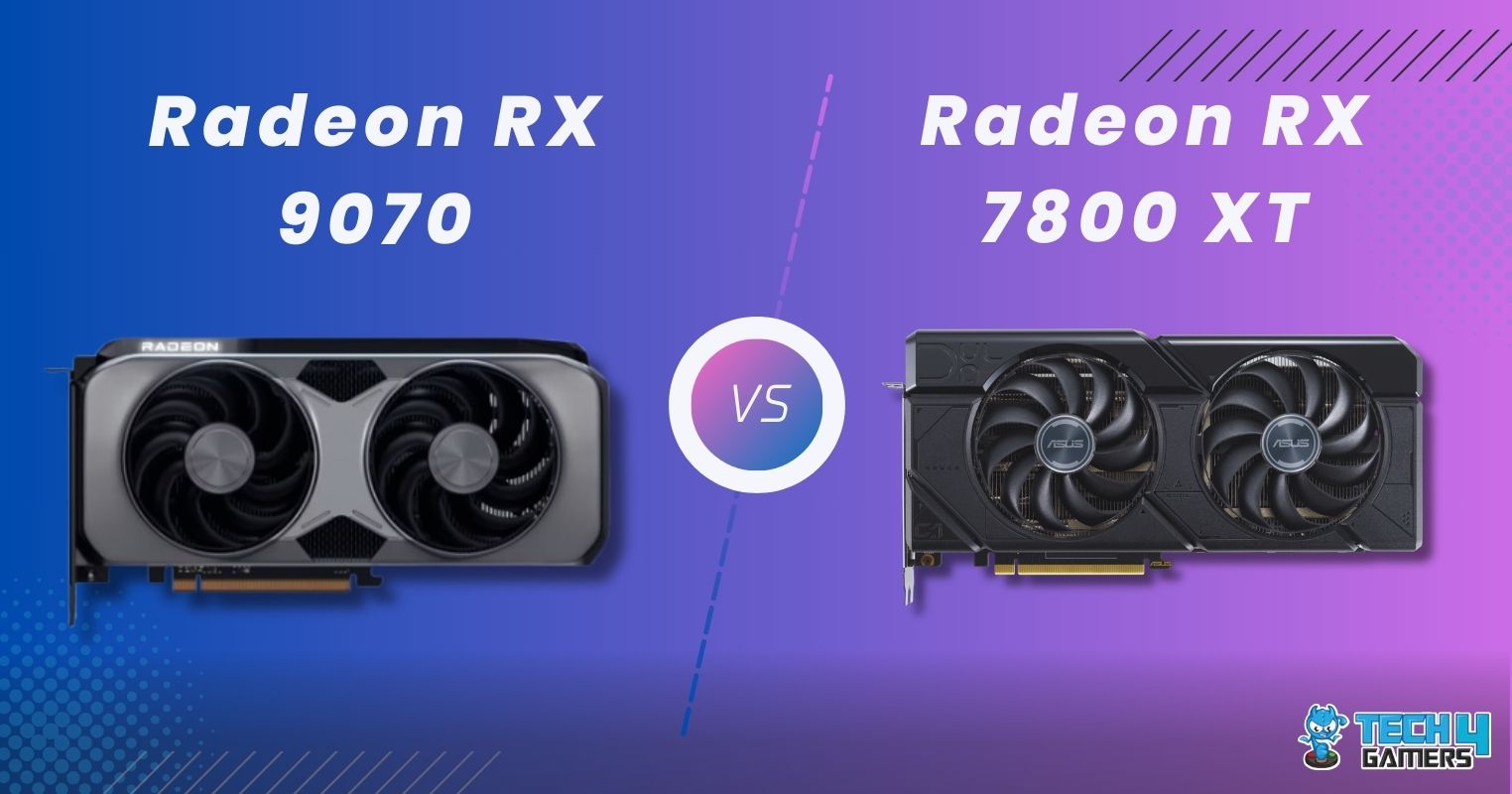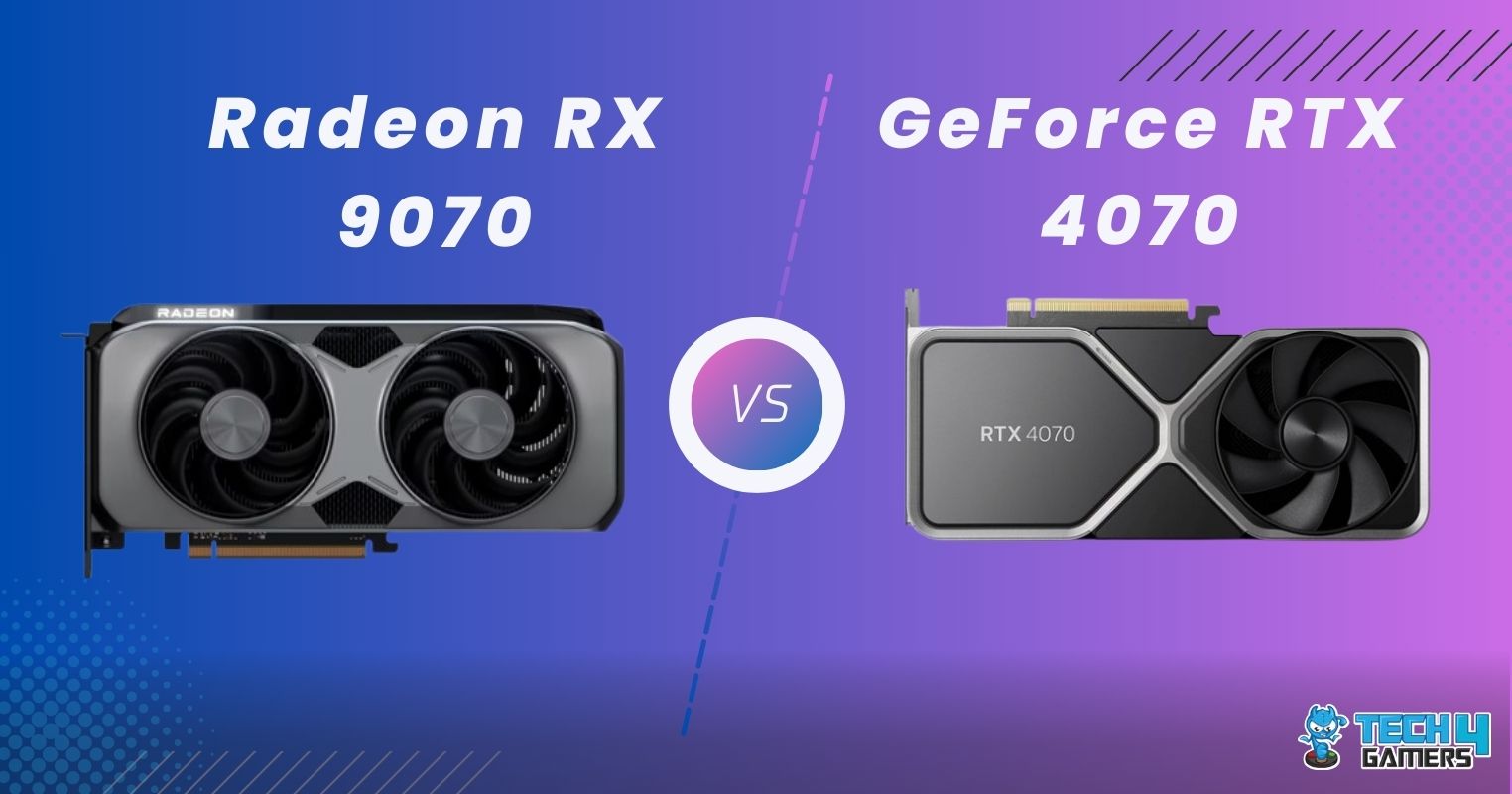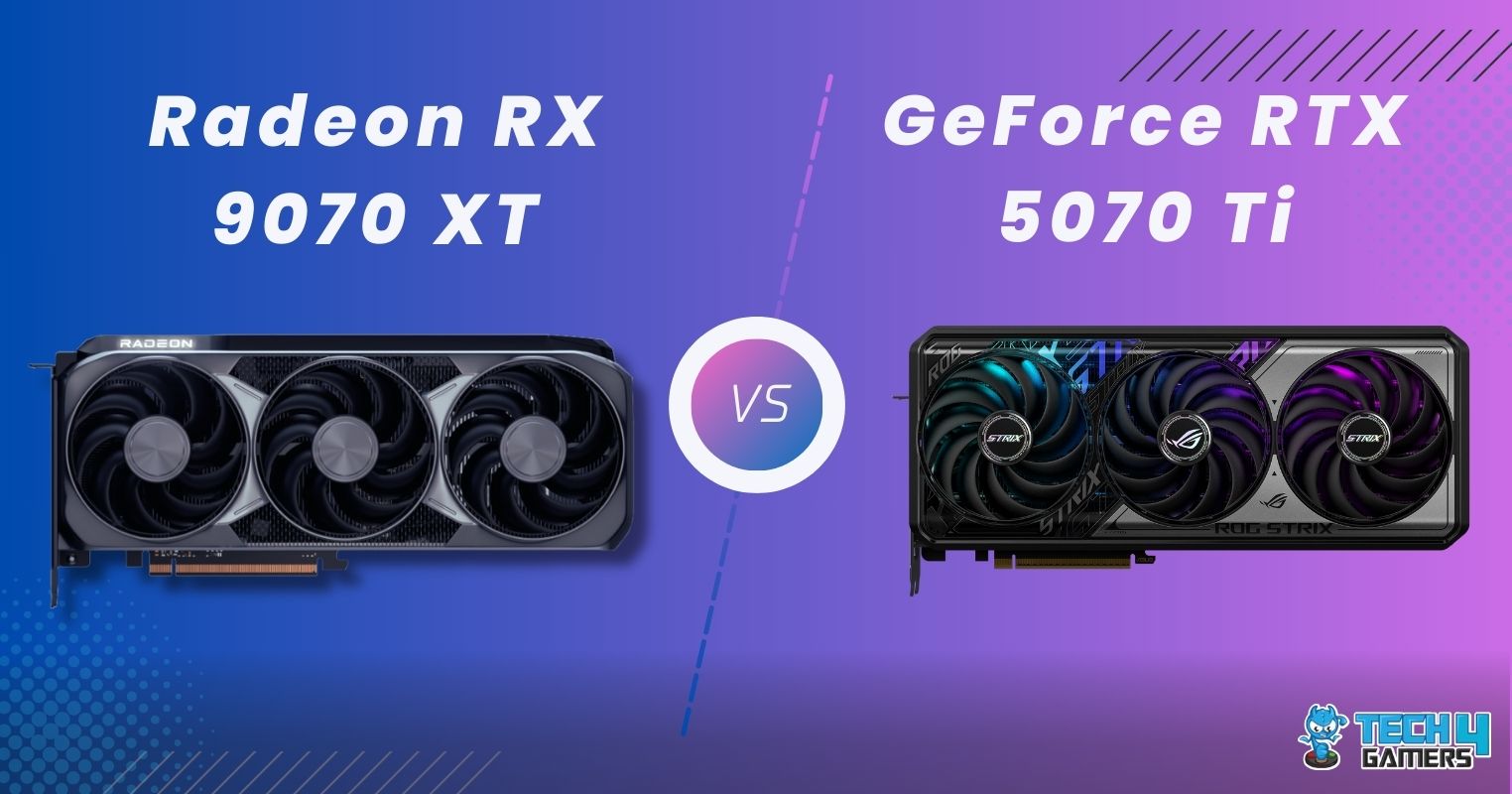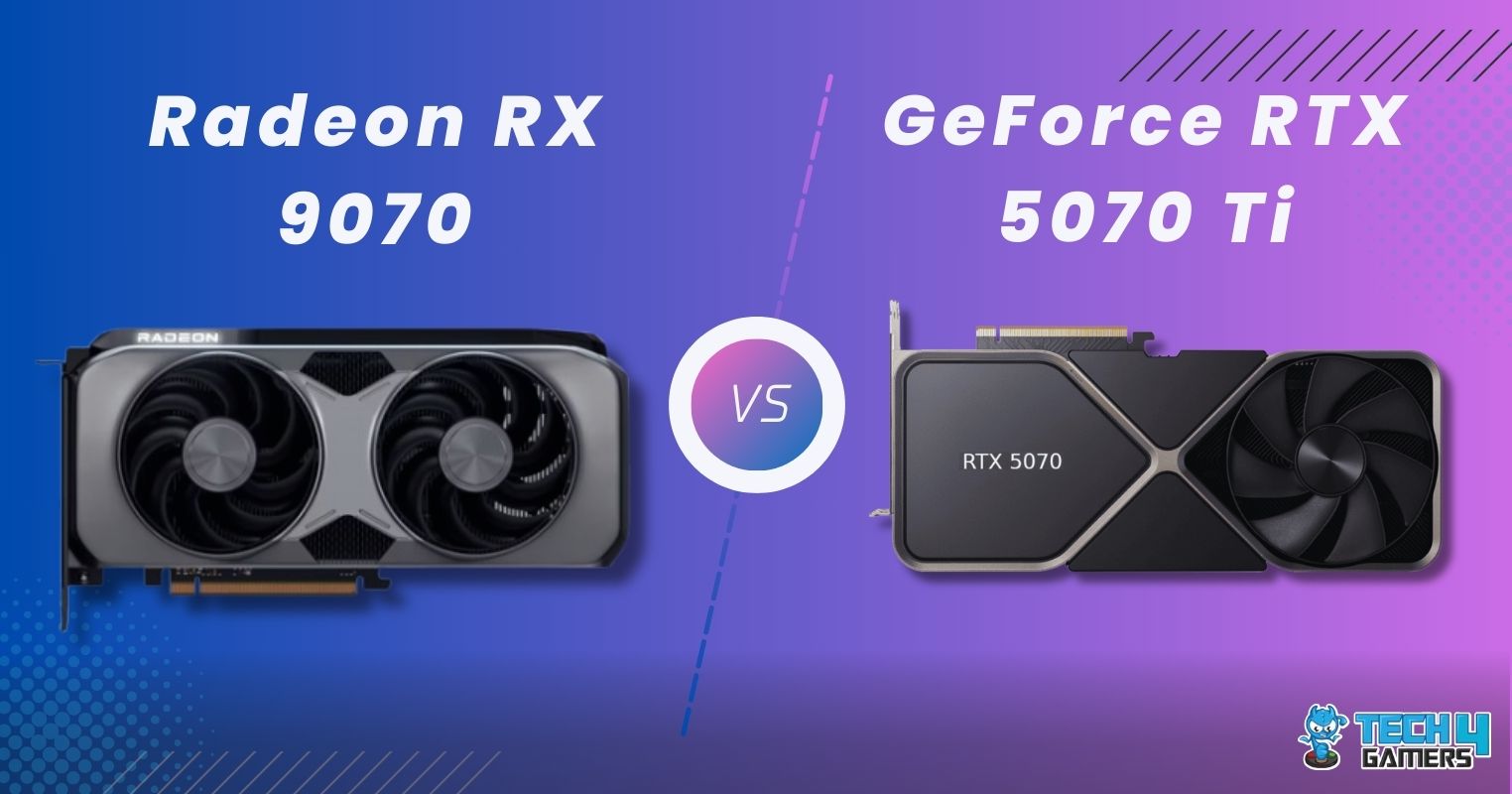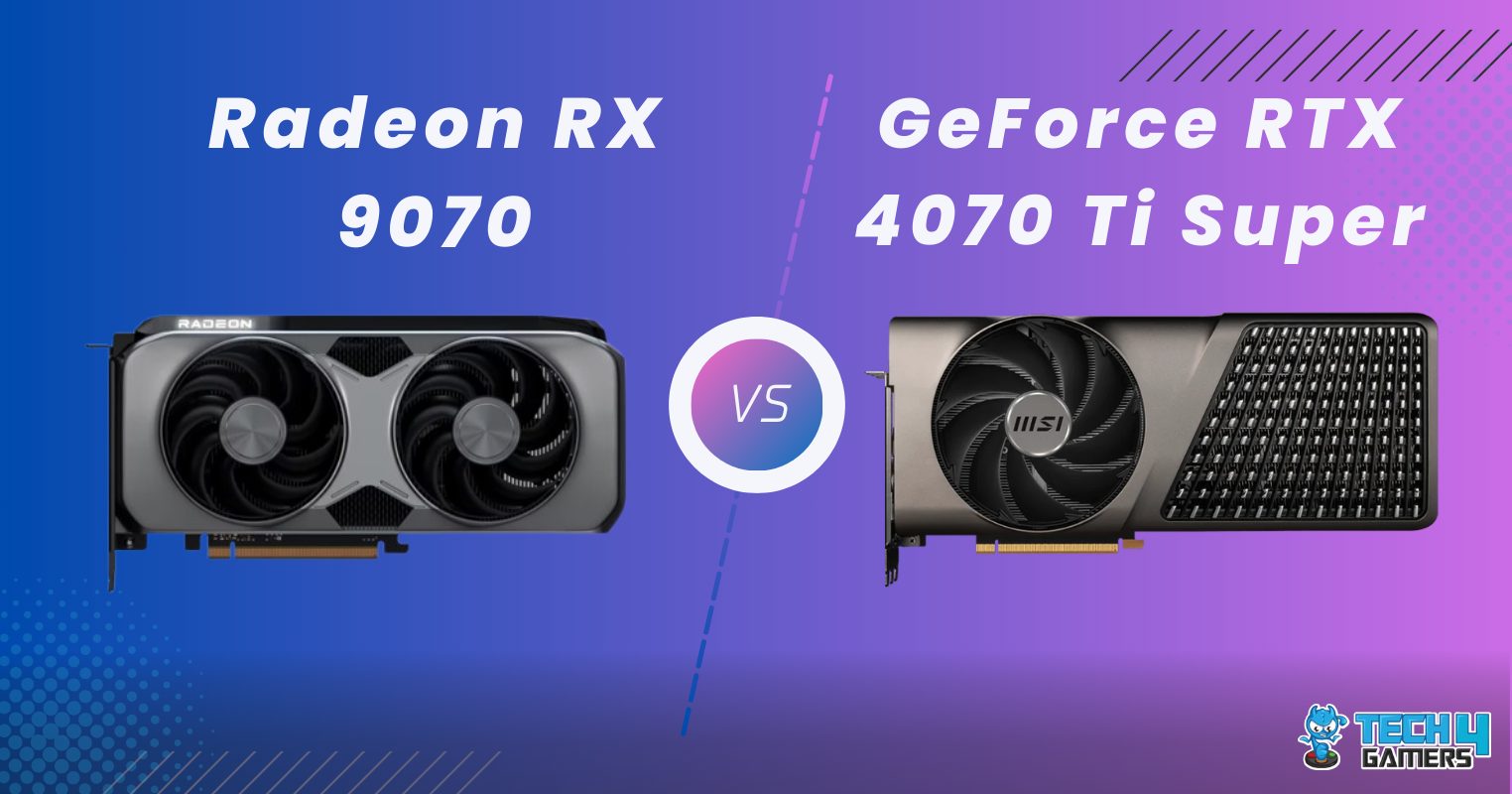AMD’s Ryzen 5 and Intel’s Core i7 lineups are two of the most popular gaming CPU lineups on the market. If you’re trying to pick your next CPU and want to know these two lineups better, this guide is for you. We’ll compare AMD Ryzen 5 vs Intel Core i7 in terms of histories, architectures, and key differences. We’ll mainly focus on the mainstream CPUs from the two lineups for convenience.
Key Takeaways
- AMD’s Ryzen 5 series is a mid-range lineup launched in 2017, while Intel’s Core i7 CPUs are part of a mid-to-high-end lineup launched in 2008.
- Comparing Ryzen 5 and Core i7 CPUs from the same year, the Core i7 CPU was 5.8% faster in 1080P gaming.
- Almost all Intel Core i7 CPUs contain integrated graphics, but on AMD’s side, only the Ryzen 5 APUs have built-in graphics.
- All the Ryzen 5 CPUs are unlocked for overclocking, but only the “K” series Core i7 CPUs support overclocking.
- Recent Core i7 CPUs typically have higher power consumption than Ryzen 5 chips.
- Core i7 CPUs are available in a larger variety than Ryzen 5 CPUs and are more expensive.
- Core i7 CPUs have anywhere from 4 to 8 (full power) cores, while Ryzen 5 CPUs have either 4 or 6 cores.
- In terms of L3 cache, the Core i7 CPUs have L3 cache counts ranging from 8MB to 30MB. The Ryzen 5 CPUs have L3 cache ranging from 4MB to 32MB.
History And General Specifications Of Intel Core i7
Intel’s Core i7 was the first to launch from their “Core i” series of CPUs in 2008. These CPUs were intended for high-end gaming, with prices around the late $200 to early $300 mark. However, the “extreme” variants with the X suffix had MSRPs as high as $999. Unlike the Core i3 and Core i5 lineups, the Core i7 lineup saw two batches of CPUs branded as 1st generation.
Initially, they were 4 core CPUs with hyperthreading (for each core, there are two threads). Regarding TDP, they were rated at under 100 watts (except for the 1st generation CPUs). Also, all the mainstream CPUs from the 2nd generation onwards contain integrated graphics. Every generation had varying amounts of L2 and L3 cache.
Also Read: Ryzen 9 3900X Vs Ryzen 5 5600X
The 4-core configuration for the mainstream CPUs continued until the launch of the 8th generation CPUs, where the Core i7 CPUs were upgraded to 6 cores. The core count was increased to 8 from the 9th generation, and hyperthreading was removed.
Then from the 10th generation, hyperthreading was added to the Core i7 CPUs, giving them 8 cores and 16 threads. This configuration has been retained as of the launch of Raptor Lake. However, the 12th generation saw the introduction of additional, low-power E-cores, which do not have hyperthreading. The 12th generation Core i7 CPUs have 4 E-cores, and the 13th generation CPUs have 8 E-cores.
History And General Specifications Of AMD Ryzen 5
Released in 2017 along with the Ryzen 3 and Ryzen 7 lineups, the AMD Ryzen 5 lineup was a mid-range lineup aimed to compete with Intel’s Core i5 CPUs. The CPUs have 4-core and 6-core options, with 6-core CPUs being slightly more expensive. The price ranges from the early $200 to the late $200 mark.
They also have simultaneous multithreading (SMT), like Intel’s hyperthreading. The Ryzen 5 3500 and Ryzen 5 3500X are the only desktop Ryzen 5 chips without SMT. Regarding TDP, these CPUs are rated at a modest 65 watts, while a few powerful variants have a TDP of 95 or 105 watts.
Unlike the Ryzen 3 lineup, the Ryzen 5 lineup is still an active focus for AMD and actively competes with Intel’s Core i5 lineup. Most recently, the Ryzen 7000 series launched two new Ryzen 5 CPUs, the Ryzen 5 7600 and Ryzen 5 7600X.
AMD Ryzen 5 Vs Intel Core i7: Differences
Now let’s look at the differences between AMD Ryzen 5 vs Intel Core i7.
Core And Thread Counts
Regarding core counts, the AMD Ryzen 5 CPUs have either 4 cores with 8 threads or 6 cores with 12 threads. The Ryzen 5 3500 and Ryzen 5 3500X carry 6 cores with 6 threads.
The Core i7 lineup varies from 4 cores, 8 threads to 8 cores and 16 threads. The older mainstream CPUs featured 4 cores with 8 threads. This configuration changed to 6 (12) in the 8th generation, then 8 (8) in the 9th generation. From the 10th generation onwards, the Core i7 CPUs have had 8 cores with 16 threads. The 12th and 13th generation CPUs have additional efficiency cores, too.
L3 Cache
Regarding the L3 cache, the Ryzen 5 CPUs have anywhere from 4MB to 32MB of L3 cache. The low-end SKUs have either 4MB or 8MB of L3 cache, while the more expensive ones have 16 MB or 32 MB of L3 cache.
The Core i7 CPUs have either 8MB or 12MB of L3 cache ranging from the 1st generation to the 9th generation. From the 10th generation onwards, the L3 cache counts increase. The 10th and 11th generation CPUs have 16MB, the 12th generation Core i7 chips have 25 MB, and the 13th generation Core i7 CPUs have 30MB of L3 cache.
Thermal Design Power (TDP)
The Ryzen 5 CPUs have TDP ratings ranging from 35 watts (power-efficient SKUs) to 65 watts for mainstream CPUs and 95 watts for the most powerful chips.
The Core i7 CPUs also have TDP ratings starting from 35 watts for the “T” SKUs and going all the way to 125 watts for high-end SKUs. The overclockable “K” CPUs have higher TDP ratings than the regular variants. Also, the 12th generation CPUs welcomed a new concept of “Boost TDP,” which can push their power consumption as high as 253 watts.
Integrated Graphics
As with the Ryzen 3 and Ryzen 7 lineups, only the Ryzen 5 APUs (having the G suffix) contain integrated graphics. The other mainstream SKUs require dedicated graphics cards.
As for Core i7, except for the 1st generation CPUs and the “X” suffix extreme CPUs, all the Core i7 CPUs have built-in graphics from Intel.
Also Check: Ryzen 7 3800x vs Ryzen 5 5600x
Overclocking Capability
One useful characteristic of the Ryzen 5 CPUs is that all of them are unlocked for overclocking, including the APUs and the low-power “E” SKUs.
On Intel’s side, only the “K” Core i7 variants are overclockable. For the locked CPUs, you can still overclock through BCLK overclocking or by using Intel’s Turbo Boost feature.
Prices And Market Aims
It can be argued that the two lineups are aimed at different markets. The Core i7 lineup is intended for the mid to high-range market, while AMD’s Ryzen 5 lineup strictly appeals to the mid-range market.
The Core i7 CPUs typically have a price point starting from $300, with high-end chips hitting the $400 mark. Looking at the Ryzen 5 CPUs, these CPUs are priced ranging from $129 (Ryzen 5 4500) to $299 (Ryzen 5 7600X).
Variety
Looking at the variety, the Core i7 lineup has many CPUs to choose from, and new CPUs are released with every generation. Most recently, Intel’s 13th generation release saw the launch of 7 new Core i7 CPUs.
AMD’s Ryzen 5 CPUs also have a diverse collection, but less than the Core i7 CPUs. The most recent Ryzen 7000 series introduced us to only 2 new Ryzen 5 SKUs.
Performance
We can’t compare the performance of the AMD Ryzen 5 vs Intel Core i7 lineups, but we can get a good idea by comparing two CPUs from the lineups instead. The best comparison would be Core i7-13700K vs Ryzen 7 7600X, two high-end CPUs from their respective lineups. Both CPUs were launched in late 2022. The Core i7 13700K costs $409, while the Ryzen 5 7600X has an MSRP of $299.
Test Bench
- Ryzen 5 7600X on MSI MEG X670E ACE
- Intel Core i7-13700K on Asus ROG Strix Z790-E Gaming
- CPU Cooler: Corsair iCue H150I Elite
- Graphics Card: Asus TUF Gaming RTX 4090 24GB
- Memory: Corsair Dominator Platinum RGB 32GB (2×16) DDR5 6000MHz
- SSD: Samsung 980 PRO 2TB PCIe 4.0 NVMe M.2
- HDD: Western Digital Blue 4TB Desktop Hard Disk Drive
- Operating System: Windows 10 Pro
- Power Supply: Corsair RM1000X 1000 Watts
Assassin’s Creed: Valhalla
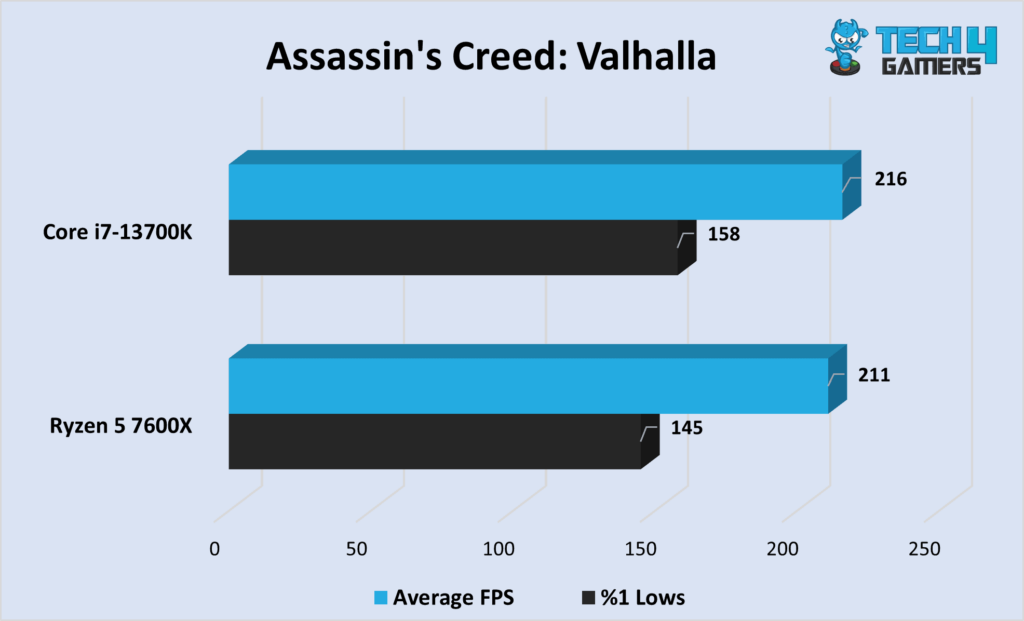
- The i7-13700K has a small lead in terms of average FPS, scoring 216 FPS compared to 211 FPS of the Ryzen 5 7600X.
- The Ryzen 5 7600X’s score falls to 145 FPS when it comes to the %1 lows, which is nearly 9% less than the Core i7-13700K’s score.
Cyberpunk 2077
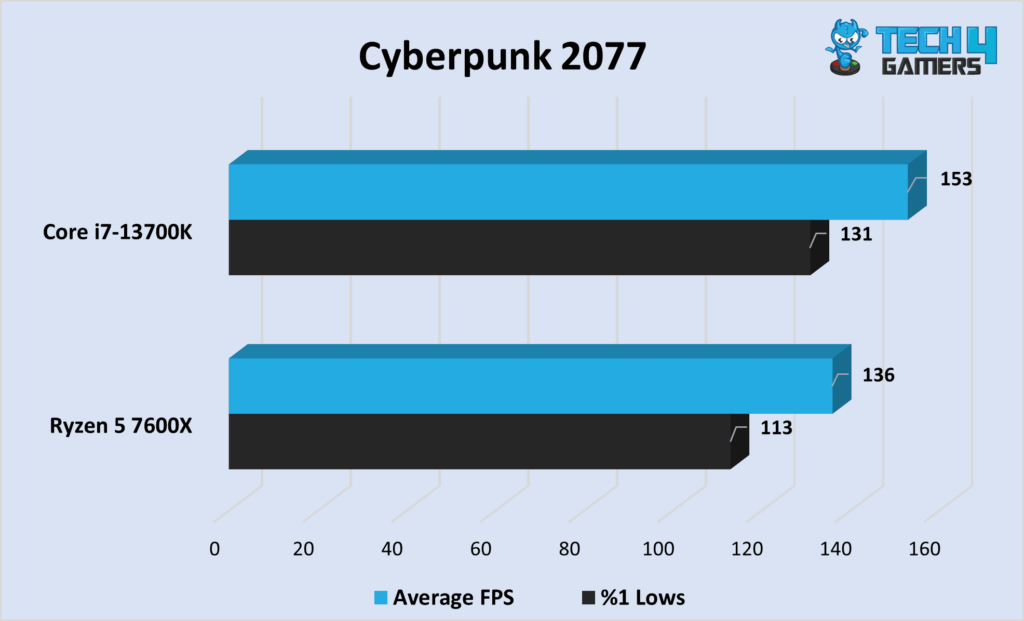
- The Core i7-13700K manages 153 FPS on average, while the Ryzen 5 7600X falls behind with 136 FPS.
- Coming to the %1 lows, the Core i7-13700K manages 131 FPS in reply to 113 FPS of Ryzen 5 7600X.
Far Cry 6
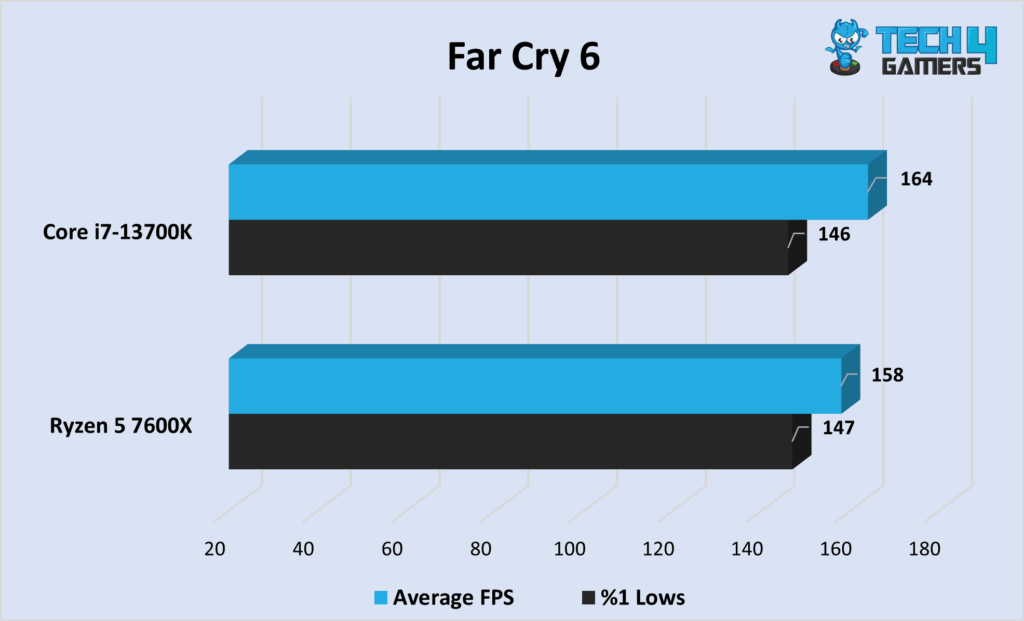
- In Far Cry 6, the i7-13700K pulls ahead again with 164 FPS on average. On the other hand, the Ryzen 5 7600X manages 158 FPS.
- The Ryzen 5 7600X manages to pull ahead of the i7-13700K by a measly 1 FPS, in terms of %1 lows.
Also Read: Ryzen 5 7600x vs Ryzen 5 5600x [Gaming & Productivity]
Forza Horizon 5
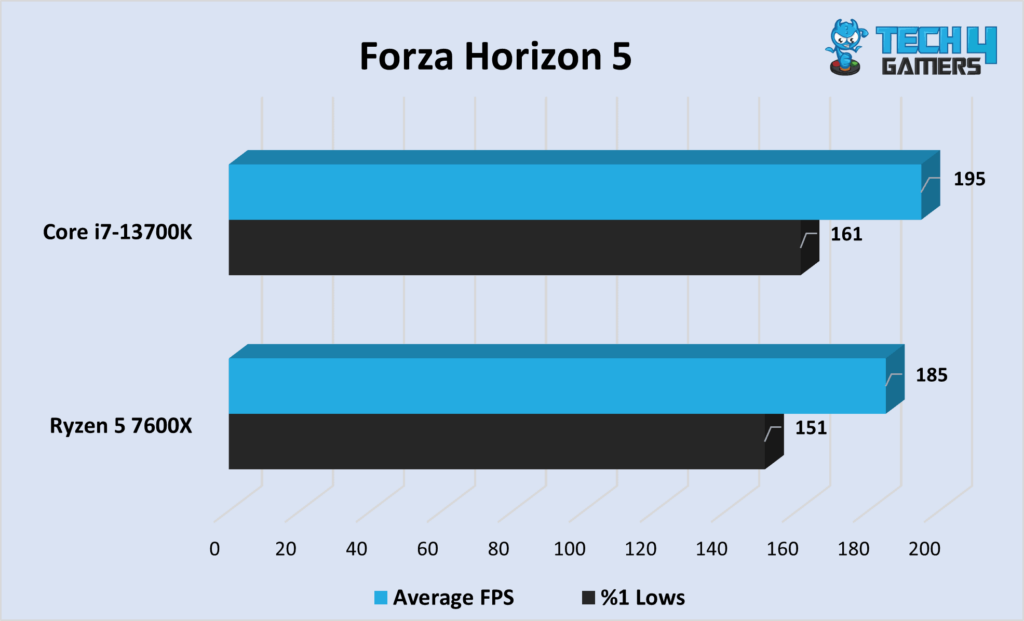
- Moving to Forza Horizon 5, the Ryzen 5 7600X is just behind the i7-13700K with 185 FPS, on average.
- The Ryzen 5 7600X racks up 151 FPS as far as the %1 lows are concerned. The i7-13700K scores 161 FPS.
God Of War
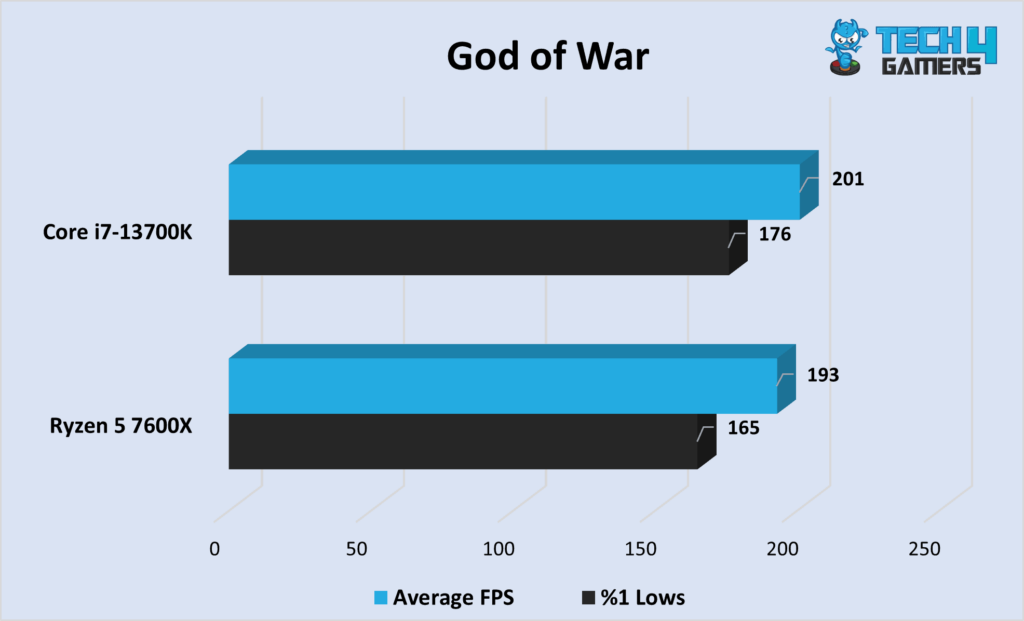
- Intel’s Core i7-13700K has another marginal lead in this title, maintaining its lead by 4.1%.
- The Ryzen 5 7600X manages to score 165 FPS and, again, is behind the i7-13700K which scores 176 FPS.
Hitman 3
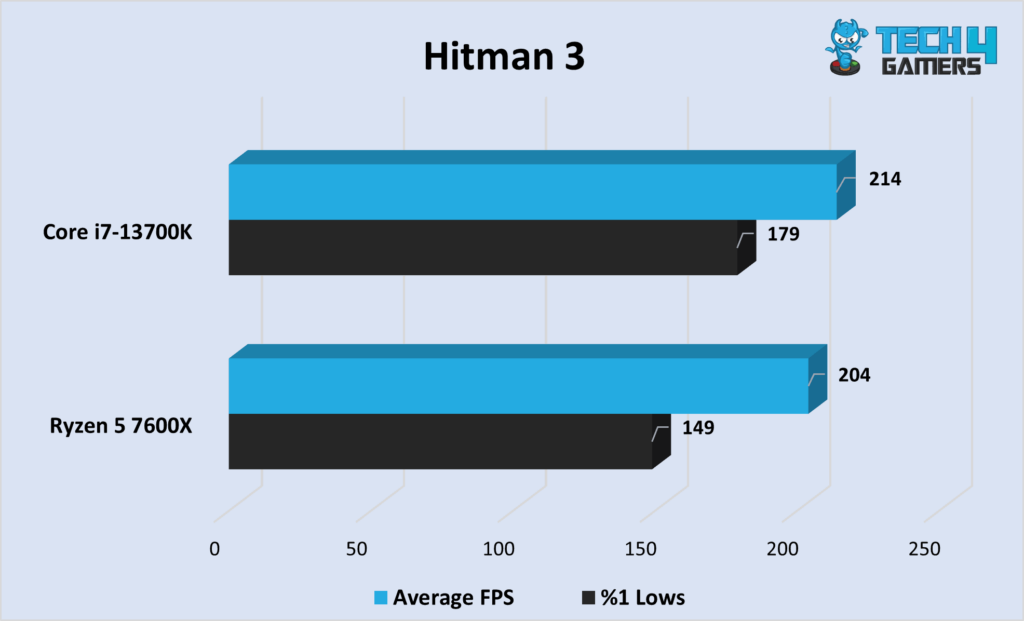
- The i7-13700K scores 214 FPS on average and is 4.9% faster than the Ryzen 5 7600X in this test.
- AMD’s Ryzen 5 7600X lags far behind the Core i7-13700K in terms of %1 lows – by 20.1% in exact.
Horizon Zero Dawn
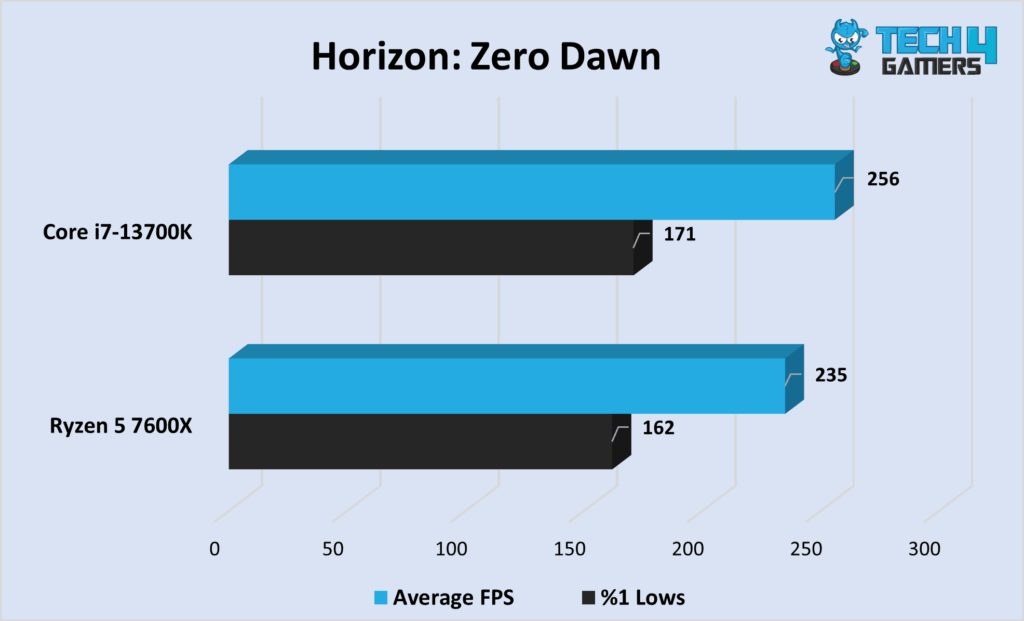
- The i7-13700K has a significant lead here, recording 256 FPS on average. Its AMD rival scores 235 FPS in response.
- The i7-13700K achieves 171 FPS when it comes to the %1 lows while the Ryzen 5 7600X scores 162 FPS.
Overall Gaming Performance: Ryzen 5 Vs Core i7
Let’s summarize the comparison in gaming performance between the two CPUs.
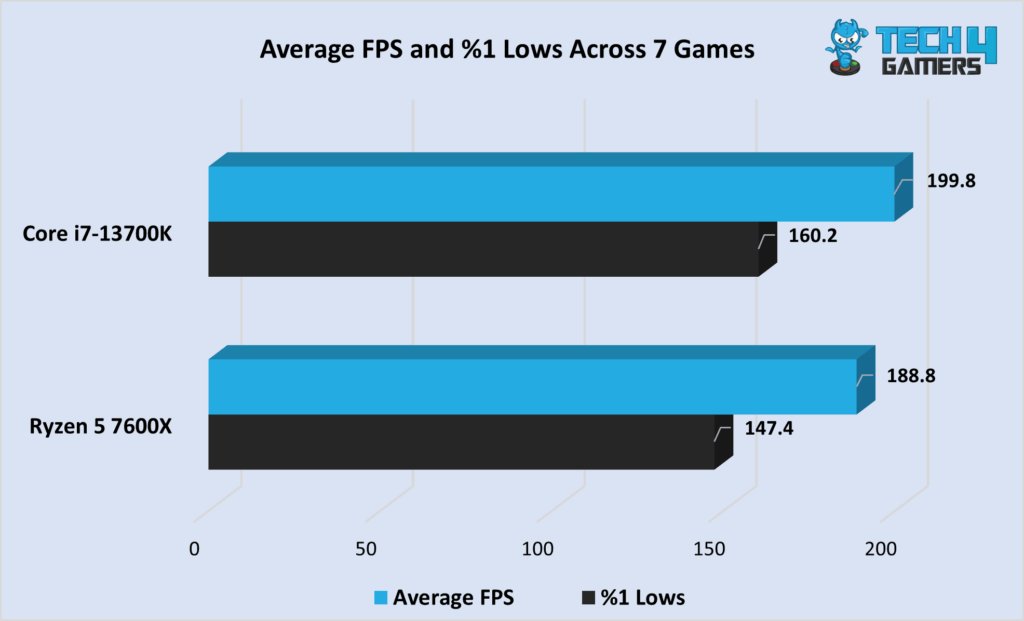
- The Core i7-13700K scores 199.8 FPS on average across the 7 games, while the Ryzen 5 7600X chalks up 188.8 FPS on average.
- The Core i7-13700K is, therefore, 5.8% faster than the Ryzen 5 7600X in 1080P gaming.
- In terms of the %1 lows, the Core i7-13700K is 8.6% faster.
Also Check: Core i5 12600K vs Ryzen 5 5600X [Gaming Benchmarks]
AMD Ryzen 5 Vs Intel Core i7: Overall Comparison
Let’s look at the overall comparison of the two CPU lineups from what we have discussed. Remember that a cross sign does not mean the feature is completely missing from that lineup (overclocking capabilities and integrated graphics). Those fields that are left blank can’t be directly compared between the two lineups due to too many variables.
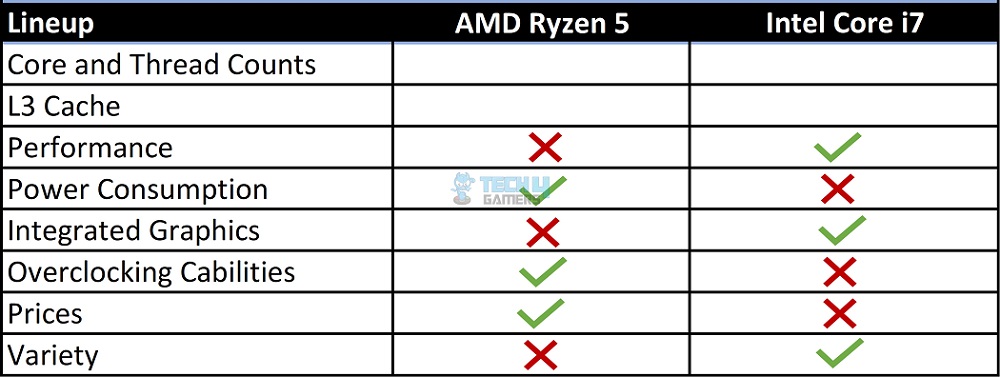
So, in terms of performance, the Core i7 lineup takes the crown. This is unsurprising as the Core i7 lineup competes with the Ryzen 7 lineup. Regarding power consumption, recent Core i7 CPUs typically have higher power draws than Ryzen 5 CPUs. When it comes to integrated graphics, the Core i7 lineup is better since all modern Core i7 CPUs have built-in graphics.
All the Ryzen 5 CPUs have overclocking capabilities, giving AMD the win. Regarding prices, the Ryzen 5 lineup wins again since Ryzen 5 CPUs cost $299 at most, while Core i7 CPUs have a starting price point of around $299.
Finally, talking about variety, the Core i7 lineup bags another win. There are 13 generations of Core i7 CPUs to choose from, with multiple CPUs coming every generation. On the other hand, there are 5 generations of Ryzen 5 CPUs, and the latest generation has only two new Ryzen 5 SKUs.
Final Thoughts
The Core i7 and Ryzen 5 CPUs are different lineups aimed at different markets. Both the lineups have their advantages and disadvantages, but at the end of the day, the Core i7 lineup is better than Ryzen 5 in terms of pure performance while being somewhat more expensive.
The Core i7 lineup competes with AMD’s Ryzen 7 lineup, while the Ryzen 5 lineup goes head-to-head against Intel’s Core i5 lineup. In any case, we hope that our AMD Ryzen 5 vs Intel Core i7 comparison proved to be useful to you.
The AMD vs Intel comparison is only the first thing you need to consider before choosing a CPU. Read our guide if you need further help choosing a CPU for your PC.
Frequently Asked Questions
Intel’s Core i7 lineup is generally better in performance compared to AMD’s Ryzen 5 lineup. However, the Core i7 CPUs are also more expensive than Ryzen 5 chips.
Except for “X” SKUs and 1st generation Core i7 CPUs, all other Core i7 chips have integrated graphics.
AMD’s CPUs use the term “SMT” or simultaneous multithreading instead of hyperthreading. All Ryzen 5 CPUs except the Ryzen 5 3500X and Ryzen 5 3500 have SMT support.
More From Ryzen 5 & Core i-7
- Intel i3-12100F vs Ryzen 5 5600x [Full Comparison]
- i7-13700K Vs Ryzen 9 7900X: Which Is Better?
- i7-13700K Vs i5-13600K [Gaming Benchmarks]
Thank you! Please share your positive feedback. 🔋
How could we improve this post? Please Help us. 😔
[Hardware Reviewer]
Hi! I’m Ali Tauseef, and I have been writing for Tech4Gamers since 2022. I love all things computer hardware but am particularly fond of CPUs and motherboards, and I like to stay up-to-date about the latest advancements in these worlds, and when possible, write about it. When I’m not doing that, I like to get into a little FPS action in CS2 or get lost in the vast world of RDR2.
Get In Touch: ali@tech4gamers.com


